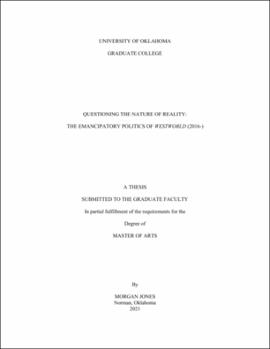Questioning the Nature of Reality: The Emancipatory Politics of Westworld (2016-)
| dc.contributor.advisor | Smith, Laurel | |
| dc.contributor.author | Jones, Morgan | |
| dc.date.accessioned | 2021-05-14T14:23:00Z | |
| dc.date.available | 2021-05-14T14:23:00Z | |
| dc.date.issued | 2021-05 | |
| dc.identifier.uri | https://hdl.handle.net/11244/329561 | |
| dc.description.abstract | The myth of the American West is rooted in a visual language of commodification, nationalism, and violence. The Western film genre codifies this aesthetic representation of space; it naturalizes the United States’ continuing colonization of the American West. To critique this popular geographic imaginary of the West, I analyze the long form television series Westworld (HBO 2016-). Drawing on film geographies, feminist geopolitics, and Jacques Rancière’s politics of aesthetics, I argue that the first season of Westworld can deconstruct our perceptions of the West, illuminate the power structures we take for granted, and create new emancipatory space. Keywords: Westworld, film geographies, feminist geopolitics, Jacques Rancière, aesthetic politics, emancipatory politics, Western, geographical imaginary, landscape, American West | en_US |
| dc.language | en_US | en_US |
| dc.subject | geopolitics | en_US |
| dc.subject | feminist geography | en_US |
| dc.subject | film geographies | en_US |
| dc.subject | emancipatory politics | en_US |
| dc.subject | Geography. | en_US |
| dc.title | Questioning the Nature of Reality: The Emancipatory Politics of Westworld (2016-) | en_US |
| dc.contributor.committeeMember | Purcell, Darren | |
| dc.contributor.committeeMember | Fields, Alison | |
| dc.date.manuscript | 2021-04-27 | |
| dc.thesis.degree | Master of Arts | en_US |
| ou.group | College of Atmospheric and Geographic Sciences::Department of Geography and Environmental Sustainability | en_US |
Files in this item
This item appears in the following Collection(s)
-
OU - Theses [2169]
